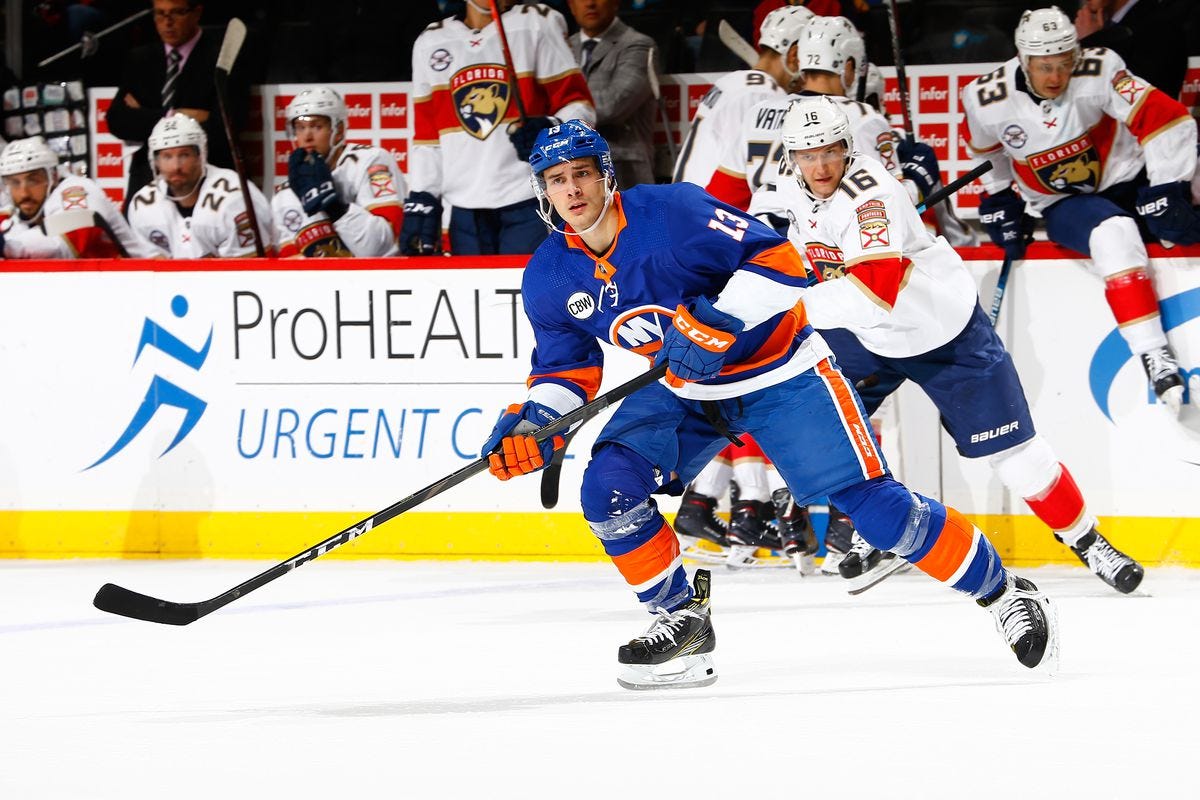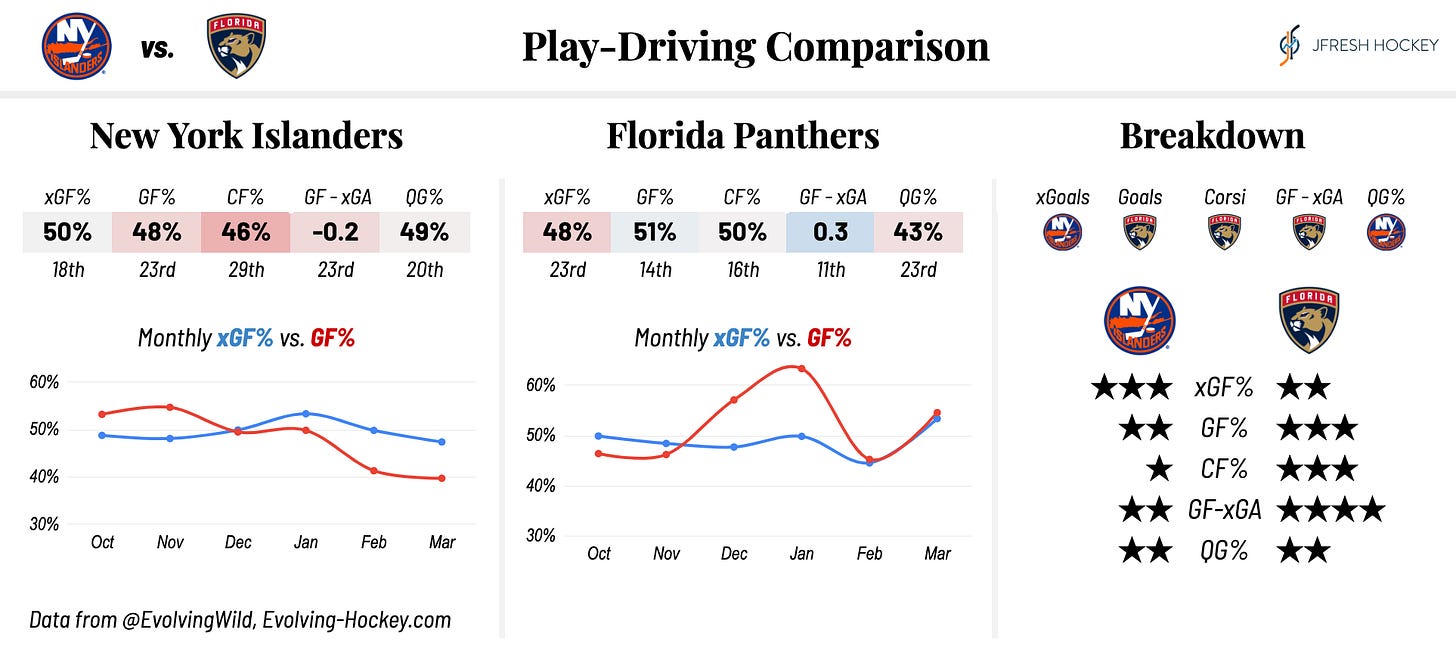
Back in 2016, in a series that I definitely without a doubt remember more about than just the overtime series-winning goal, the New York Islanders and Florida Panthers faced off in the first round of the playoffs, each angling for their first second-round berth since the mid-90s. Since then, these two franchises have witnessed more change than perhaps any others in the play-in. The Panthers fired their GM, hired a bunch of “computer boys”, fired their Adams-nominated coach, rehired the old GM, booted the computer boys, fired another coach, lost two top six forwards in the expansion draft for no reason, fired another coach, and signed a goalie to a $70M contract. The Islanders fired their coach, had a player win the Calder, lost their franchise centre in free agency, fired their GM, fired another coach, and improbably made the playoffs. Now they meet once again. The Islanders want to show that their success last season wasn’t a flash in the pan and that they’re built to compete sustainably, while the Panthers are desperate to return to the playoffs and validate their expensive roster and front office decisions.
In this piece I’ll go through the two teams’ play-driving, offensive, and defensive stats before comparing their respective forwards, defencemen, and goaltenders. For information on the stats used, refer to this explainer article or visit EvolvingHockey and MoneyPuck. You can also read my previous previews of EDM-CHI, PIT-MTL, NSH-AZ, CAR-NYR, and VAN-MIN.
Play-Driving

The play-driving numbers here kind of encapsulate why this series is not projected to be overly exciting. The Islanders are by no means an analytical darling, below-average across the board at 5v5. They were an even expected goals team, a little worse than that in terms of actual goals, and a little worse than that in terms of shot attempt share. They were pretty consistent in terms of expected goals over the course of the year but got progressively worse at translating that into actual goals as the season went along. On the other hand, they Panthers were worse at driving play but much better in terms of goals for due to their shooting luck/ability. Winner: Islanders
Team Offence

The Florida Panthers scored a lot of goals this season - 4th most in the NHL at 5v5. They did it by massively outperforming expectations; six Panthers shot at least 3% above expected including noted snipers Noel Acciari, Mark Pysyk, and MacKenzie Weegar. This shooting bender only started to abate near the end of the season including a four-game cold stretch in March before the hiatus. While certain players should see their shooting remain steady, like Brett Connolly, Mike Hoffman, and Jonathan Huberdeau, I don’t think the Panthers can count on those pucks going in forever. The Islanders, to say the least, were not blessed with the same shooting luck. They finished 26th in the league in finishing, not ideal considering that their quality chance generation wasn’t exactly overwhelming. I don’t think they’re necessarily primed for regression though, because their poor finishers were bottom-six grinders like Matt Martin, Cal Clutterbuck, and Leo Komarov. Poor shooting seems to be a matter of roster construction rather than bad puck luck in this case. They were better than the Panthers at creating expected goals, but aside from January were nonetheless below-average in that regard.
Despite the percentage luck, I have to give this to the Panthers. While they have inferior xGF numbers, I trust their ability to slightly outperform their shots more than the Islanders’ ability to even meet expectation. Add in the powerplay edge and it’s decisive. Winner: Florida
Team Defence

It’s the Islanders. Not even close. Their defence has declined quite a bit since last season, and they’ve started to allow their opponents to get some quality net-front opportunities that they had previously denied them, but they still far exceed the Panthers across the board here. Florida allows plenty of good opportunities and their goaltenders have not demonstrated an ability to stop them. It’s worth mentioning that Sergei Bobrovsky has chilled out a bit since those first few months, and might not be as bad as his overall season numbers show now that he’s adapted to his new environment, but he’ll have a lot of work to do to even this one out. Winner: Islanders
Forwards

These two teams are quite similar in terms of the construction of their forward groups based on the series’ projected lines. The Islanders are thin on top-end talent but have a relatively balanced if unexceptional top six, while the Panthers have two legitimate stars but surround them with mediocre players.
It’s no secret that the Islanders’ offensive performance has taken a bit of a hit since they implemented Barry Trotz’s stingy system, but the talent on their top two lines is enough to give them the advantage in that category. While the team is pretty weak on the right side, with Jordan Eberle and Josh Bailey both taking major steps backwards since 2018, Mathew Barzal, Anders Lee, Brock Nelson, and Anthony Beauvillier are all capable of driving offence. The same cannot be said of the Islanders’ third line, which projects to be extremely anemic offensively. Finally, the “best fourth line in hockey” is probably the ~10th best fourth line in hockey at this point, but Casey Cizikas in particular is one of the best defensive centres in the game and fully capable of shutting down opponents.
It’s hard to look at the Panthers’ forward group without getting the impression that it seems pretty thrown together. You’ve got a replacement-level forward in Frank Vatrano on the top line, a bottom-sixer in Haula centring the second line, and a literal defenceman on the fourth line. Aleksander Barkov is of course a tremendous talent, but his defensive analytics have never even come close to matching his reputation and his goal-driving was underwhelming this season. Jonathan Huberdeau had his best season yet, especially in terms of scoring, but has to play with significantly less talent than he grew accustomed to this year. Their fourth line projects excellently here, but features three of the largest beneficiaries of the Panthers’ puck luck which unavoidably inflates their offensive numbers.
Neither of these teams is anything special at forward, but the balance of the Islanders is a safer bet than the hodge-podge of the Panthers. Winner: Islanders
Defencemen

This mismatch might come as some surprise given the Islanders’ better overall defensive numbers, but the Panthers’ blueline projects as superior. Each of the Islanders’ blueliners saw their isolated numbers take a hit this season, perhaps unsurprising based on what we know about age curves but still disappointing.
Adam Pelech underperformed in a shortened campaign this year, but has been one of the league’s better defensive defencemen in the past three season. The same is true of Ryan Pulock, who has been 90th percentile defensively for two consecutive years. However, this duo (which is about average as far as NHL top pairings go) is completely outmatched by Mackenzie Weegar and Aaron Ekblad. Weegar broke out this season, finishing with elite defensive numbers and very strong offensive ones in sizeable minutes against strong competition. Despite his lack of name recognition, he was among the league’s best this year. After a few rough goes earlier in his career, Ekblad has rounded into form as a strong top pairing two-way defenceman as well.
The second pair battle is a mismatch as well, but going the other way. Devon Toews has been a revelation in the past two seasons, incredibly strong at both ends of the ice and perfect for a second pairing role. He projects as the best defenceman on either team. Stralman and Stillman are both capable but not ideal in a top 4 role at this point. Finally, as I’ve broken down elsewhere, Nick Leddy and Johnny Boychuk are absolute liabilities at this point in their careers, and the Islanders would be far better-served to play Andy Greene and Noah Dobson instead. Keith Yandle and Mike Matheson aren’t exactly going to win any prizes for defending any time soon (especially not Yandle), but they’re at least better than their counterparts. Winner: Florida
Goaltending

This is a win for the Islanders, but maybe not as comprehensive a win as it looks at first. Sergei Bobrovsky did indeed rank as one of the worst starting goalies in the NHL this season, a massive disappointment for the Panthers considering his gigantic contract and the hopes they had pinned on him to carry the team back to Stanley Cup contension. But if you break down his numbers by month there’s slightly more reason for optimism. He allowed 10 of his 13 goals allowed above expected before November 15th, his first few games following a jarring change in team from the stingy Blue Jackets to the porous Panthers. After that - and potentially after adjusting to his new environment - he hovered around expectation for the remainder of the season. His overall body of work was still very poor, and his rebound control in particular was awful this season, but those expecting a washed up sieve might be disappointed. For the Islanders, Semyon Varlamov played consistently solid hockey with only a slight dip in January to blemish his record. He was the best PK starter in the league and finished in the top ten overall. Was he 2019 Robin Lehner? No, which is why I’ve seen many Isles fans disparage him (probably also a bit of denial that their team defence got worse as well). But he gives the Islanders what they need. Winner: Islanders
Conclusion
Last season, the Islanders made a lot of people look very stupid (including me) by sweeping the Pittsburgh Penguins in the first round. Most analytically-minded people reasonably believed that the Islanders’ results were unsustainable based on their high PDO and the ridiculous goaltending they had received. This season is different, though. The Isles did indeed regress from a percentages standpoint (from 102.2 to 100.2), and their overall performance this season is probably a fair snapshot of their capabilities as a team. I don’t see them as a major contender but I think they should be able to win this series. The Panthers have some very promising pieces, and could seriously compete in the future if they make the right moves to support their star players, but I don’t think they’re there yet. Sergei Bobrovsky is an x-factor who could come out of nowhere like he did last playoffs, but I think the smart money is on New York here. Prediction: Islanders in 4.



